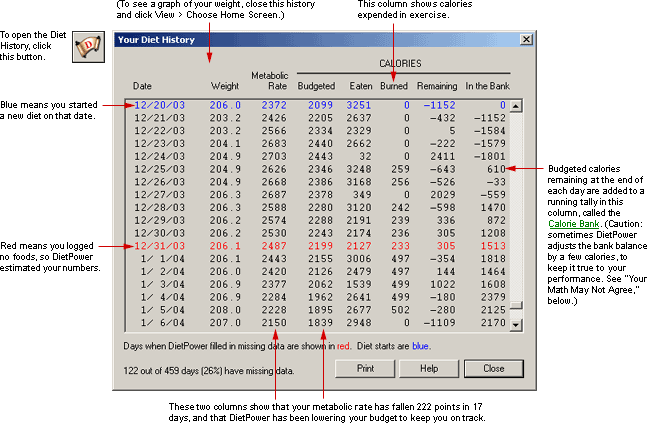
At a Glance
The Diet History is a table that chronicles your daily weight, calorie intake, and metabolic rate.

In Detail
Your Diet History is a chronology showing your weight, metabolic rate, and calorie consumption for each day since you enrolled in Diet Power.
To open your Diet History:
From your Home Screen:
click
the Diet History button: ![]()
or
open the Diet Menu (by clicking the word Diet) and choose "Diet History."
Interpreting the History
The summary for each day is a single line, and the days are listed in chronological order, from your enrollment date at the top to today's date at the bottom. From left to right, the figures in each line are:
Date: the day that the line summarizes
Weight: the body weight you logged that day
Metabolic Rate: the net calorie consumption (calories eaten minus those worked off in exercise) required to maintain that day's weight
Budgeted: the net calories allotted for the diet you had in effect that day. (If you were on a maintenance diet, this will be the same as your metabolic rate.)
Burned: the number of calories you recorded in that day's Exercise Log
Eaten: the number of calories you recorded in the day's Food Log
Remaining: the number that were still available in your budget. These are deposited in the Calorie Bank at the end of each day. (If the number is negative, calories are withdrawn from the bank because you overate.)
In the Bank: the number of uneaten calories accumulated during the diet you were on. (If the number is negative, you were a net overeater.)
Your Math May Not Agree
In theory, if you add yesterday's "Remaining" and "In the Bank" figures, you should get today's bank balance. Sometimes you won't, however. That's because Diet Power occasionally adjusts the balance by a few calories to keep it true to your performance. If you're two pounds above today's target weight, for example, your balance should be -7000 calories, because each new pound of body weight represents 3500 calories of overeating. The adjustments occur only when your bank balance and weight disagree by more than one pound, however -- and even then, the adjustment is never more than 5 percent of the disagreement. You can think of these 5-percent adjustments as bank charges or credits declared to help balance your books.
Color Coding
Red figures are phantom data, filled in by Diet Power because you logged no foods that day. In each case, the program assumes your net intake was the same as your average for the preceding 30 days,* plus or minus a percentage based on your weight change that day. (For details, see Skipped Days.)
Blue lines show when you began a new diet. (In the rare event that you began a diet but logged no foods that day, this color will supersede the red described above.)
Black lines indicate normal days, when you neither started a new diet nor left your Food Log blank.
|
* |
If you haven't been using Diet Power that long, for your pre-enrollment dates it uses data for an average person of your weight and sex. |
Printing
The Print button at the bottom of your Diet History will print the complete history.
To revisit any day in the history...
...double-click the date you're interested in. Diet Power will automatically change the working date to the day in question and take you back to the Home Screen. From there, you can open any option and review or revise the day's work.
When you're finished, change the working date back to today by doing any of the following:
Returning to the Diet History and double-clicking today's date
Opening the Calendar and clicking the Today! button.
Clicking anywhere outside the graph on your Body History screen.
In the Food and Exercise logs, using the date picker in the lower-left corner of the dialog.
To close your Diet History...
...click the Close button or press Enter or Escape on your keyboard.
Got a Suggestion for This Page?
Last Modified: 2/28/04